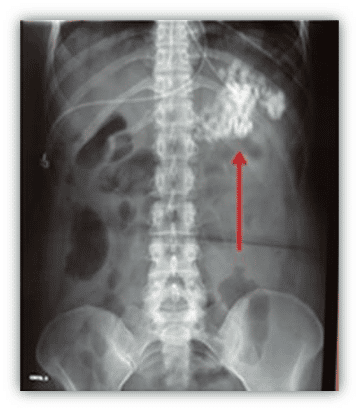
The Impact of Calcium Containing Medications on Abdominal X Ray Imaging
Role of Calcium in the Human Body
Calcium is a vital and abundant mineral in the human body, playing a vital role in various biological mechanisms including:
-
Bone and Teeth Health
-
Muscle Contraction and Relaxation
-
Nerves’ Signaling
-
Blood Clotting Process
-
Heart Rhythm Regulation
Most of the body’s calcium supply is stored in the bones. To maintain good bone health, we need a steady intake of calcium. When calcium levels are depleted in the blood, the body compensates by extracting stored calcium from the bones, which can lead to weakened bones. To restore calcium levels, it is essential to consume calcium-containing foods and meet our daily calcium requirements. We typically obtain calcium from sources such as vegetables, fruits, meat, dairy products, and supplements.
Calcium Supplements
Calcium supplements are essential for maintaining adequate blood calcium levels, particularly for those individuals who may not get enough from dietary sources. However, it's important to choose the right type of supplement and use it correctly to maximize benefits and minimize potential risks and side effects.
|
Age group |
Amount of calcium per day in milligrams |
|
Babies age 0 to 6 months |
200 mg |
|
Babies age 6 to 12 months |
260 mg |
|
Children age 1 to 3 |
700 mg |
|
Children age 4 to 8 |
1,000 mg |
|
Preteens, teens, and young adults age 9 to 18 |
1,300 mg |
|
Adults age 19 to 50 |
1,000 mg |
|
Women older than age 50 and men older than age 70 |
1,200 mg |
|
Men age 51 to 70 |
1,000 mg |
|
Pregnant and breastfeeding teens |
1,300 mg |
|
Pregnant and breastfeeding adults |
1,000 mg |
Types of Calcium Containing Supplements and Medications
There are various types of calcium containing supplements and medications including:
-
Calcium Carbonate: commonly available in antacids for heartburn.
-
Calcium Citrate: commonly available in supplements for improving bone health.
-
Calcium Gluconate: commonly available as injections especially used in hospitals for acute hypocalcemia and hyperkalemia and also as an antidote for magnesium sulfate overdose.
-
Calcium Docusate: commonly available in laxative medications for constipation relief.
-
Calcium Phosphatase: commonly available in supplements that include vitamin D to help improve the absorption of calcium.
-
Calcium Acetate: commonly available as injections especially used in hospitals for chronic kidney diseases on dialysis.
The Effect of Calcium on X-ray Imaging
However, these supplements can have unwanted effects on medical imaging, particularly the clarity and interpretation of abdominal X-ray images.
Calcium is a highly radiopaque mineral, meaning it effectively absorbs X-rays and appears as white or light-colored areas on X-ray images. However, ingested calcium supplements can cause artifacts or image distortion such as opaque spots or shadows, which may conceal underlying structures of the individual. The presence of “calcium” in the digestive tract can distort the X-ray image and also complicate the interpretation of abdominal X-rays, thus presenting diagnostic challenges for radiologists and physicians who may struggle to distinguish between calcium-related artifacts and pathological findings of the underlying condition of the individual.
Pharmacist’s Recommendation
To minimize interference with X-ray imaging, patients are advised to avoid taking calcium supplements at least 24 hours before the procedure. It is crucial for patients to inform their healthcare providers about any calcium-containing supplements or medications they are taking. In cases where calcium supplements are necessary, alternative imaging techniques such as ultrasound or MRI may be considered to avoid interference.
Conclusion
Calcium-containing supplements and medications are beneficial for many health conditions, but their radiopaque nature can affect the clarity of abdominal X-ray images. By understanding these effects and taking appropriate precautions, both patients and healthcare providers can ensure accurate and effective diagnostic imaging. .

|
Zheela Sherzad M. Hadad holds a Bachelor degree in Pharmacy from Eastern Mediterranean University in Cyprus. She is the Faculty Coordinator and a Laboratory Assistant in the Faculty of Pharmacy at Qaiwan International University. |





 Huawei Center
Huawei Center